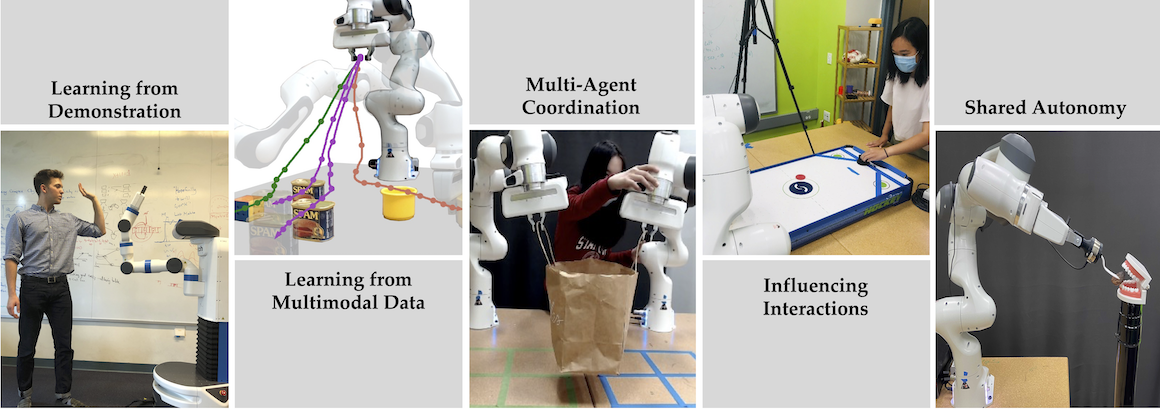CS 333: Algorithms for Interactive Robotics
Winter 2022, Class: Mon, Wed 3:15-4:45PM, 380-380W

Description:
As the field of robotics and AI is quickly emerging, one critical and challenging subject is ensuring that these agents can co-exist, coordinate, collaborate, and interact with humans. This course covers a diverse set of topics that include learning from (suboptimal) human data, coordination in repeated interactions, influencing interactions, intent inference, and shared autonomy. There will also be several guest lectures from experts in the field. Students will practice essential research skills including critiquing papers, debating, reviewing, writing project proposals, and presenting ideas effectively. The course is open to graduate and undergraduate students.
Format:
The course is a combination of lecture and reading sessions. The lectures discuss the fundamentals of topics required for modeling and design of interactive agents. During the reading sessions, students present and discuss recent contributions in this area. Throughout the semester, each student works on a related research project that they present at the end of the semester. See detailed course policies.
Prerequisites:
CS 221/229, CS 237a, and CS 238/CS 234 are recommended, but not required.
Learning Objectives:
At the end of this course you will have gained knowledge about applications of various topics in designing interactive autonomous systems.
You will also have hands-on experience working on a research project and it is expected that you will gain the following research skills: analyzing literature related to a particular topic, critiquing papers, and presentation of research ideas.
Announcements:
- COVID updates: The first two weeks of class (Jan 3 - Jan 14) will be virtual. To attend class and office hours, please use the zoom links provided on canvas.
- Readings: Please sign up for 2 presenter slots (1 pro and 1 con) and 1 respondent slot using the link provided on canvas. Please sign up for a slot by Wednesday, Janurary 5th.
- All lecture notes will be posted under the Files section on canvas.
- Long reviews will now be due at noon the day the paper is presented instead of at midnight before the class.
- Please turn in your project proposal, milestones, and final report by 11:59PM the day it is due on canvas.
- On Wednesday (2/2) Dorsa will be in room 380-380W for lecture. Anyone that is interested in joining in person should feel free to join :) Class will still be available virtually.
- Late policy: we will deduct 25% of the total points for late assignments. Please remember to turn assignments in on time!
Staff
Timeline
| Date | Lecture | Handouts / Deadlines | Notes |
|---|---|---|---|
| Week 1 Mon, Jan 03 |
Lecture Introduction Learning from Demonstrations (1) |
| Sample Long Review |
| Week 1 Wed, Jan 05 |
Lecture Learning from Demonstrations (2) |
|
|
| Week 2 Mon, Jan 10 |
Quiz+Reading Learning from Suboptimal Demonstrations, Offline RL |
|
|
| Week 2 Wed, Jan 12 |
Lecture Learning from Preferences |
|
|
| Week 3 Mon, Jan 17 |
Martin Luther King, Jr., Day (No class) |
||
| Week 3 Wed, Jan 19 |
Quiz+Reading Learning from Non-traditional Sources of Data |
|
|
| Week 4 Mon, Jan 24 |
Lecture Experimental Design |
|
|
| Week 4 Wed, Jan 26 |
Quiz+Reading Learning from Suboptimal Humans |
|
|
| Week 5 Mon, Jan 31 |
Guest
Lecture Human-Robot Interaction in Practice |
|
|
| Week 5 Wed, Feb 02 |
Lecture Multi-Agent Interactions: Game-Theoretic and Representation Learning Techniques |
|
|
| Week 6 Mon, Feb 07 |
Quiz+Reading Multi-Agent Interactions: Game-Theoretic and Representation Learning Techniques |
|
|
| Week 6 Wed, Feb 09 |
Lecture Repeated Interactions and Games |
|
|
| Week 7 Mon, Feb 14 |
Quiz+Reading Multiagent Coordination |
|
|
| Week 7 Wed, Feb 16 |
Guest
Lecture Multi-Agent Interactions |
|
|
| Week 8 Mon, Feb 21 |
Preseidents' Day (No class) |
||
| Week 8 Wed, Feb 23 |
Lecture Shared Autonomy |
|
|
| Week 9 Mon, Feb 28 |
Quiz+Reading Shared Autonomy |
|
|
| Week 9 Wed, Mar 02 | Guest
Lecture The Role of Language in Building Interactive Robotics Agents |
|
|
| Week 10 Mon, Mar 07 |
Presentation |
|
|
| Week 10 Wed, Mar 09 |
Presentation |
|
|
| Week 11 Thu, Mar 17 |
Project Reports |
|
Grading Metrics
| Component | Contribution to Grade |
|---|---|
| Student Presentations & Paper Reviews | 40% |
| Final Project | 40% |
| Quizzes & Class Participation | 20% |
| Total | 100% |
Final Project Grading
| Component | Contribution to Grade |
|---|---|
| Project Proposal Reports | 5% |
| Project Milestone Reviews | 5% |
| Project Presentation (Possibly with Demo) | 10% |
| Final Project Report | 20% |
| Total | 40% |
Grading Policies
Student Presentation & Paper Reviews (40%): All students will get a chance to present during the reading days. Each paper will have two presenters discussing the pros or cons of the paper. The presenters need to send the reviews (conference style) of their reading assignments by the noon on the day the paper is presented. The presentation grade is based on how well the material is presented in both the written review and the talk, how well it is connected to the rest of the papers or class, and how prepared the student is in answering questions from the class.
We will allocate 35 minutes for each paper (10 minutes for the paper's introduction, 10 minutes for pros, 10 minutes for cons, and 5 minutes for discussion). Both pro and con presenters should work together on the introduction. Student respondents should ask their prepared question during the discussion.
Every other student who will not be presenting is still required to write a short review of the two papers presented in reading days by noon on the day the paper is presented. The short reviews should just be a couple of sentences summarizing each of the two papers.
Final Project (40%): Each student is required to work individually or in groups of up to three people on a research project. The project requires a 1-page proposal including the relevant literature survey, a 2-page milestone review, a 5-8 page final report, and a final presentation/demo. All the page limits exclude references. Students who are taking the class for 4 units are required to work individually on their projects.
Quizzes & Class Participation (20%): There will be 6 short quizzes during the reading days on the lecture material and some of the paper readings. Students can drop 2 of the quizzes. We will also ask students to sign up as respondents and ask questions about the papers being presented. Respondents will be graded on their questions asked during the discussion period of each paper. All students should try to participate in the discussions on each paper during the reading days.
Project Instructions
The research project throughout the class should be a literature survey or study a new research problem, i.e., design a new algorithm, study a new application, etc. The main deliverables of the project are:
Project Proposal Reports (5%): A 1-page proposal that has identified the problem definition, a literature survey on the problem, a potential solution, and a timeline. Please turn it in by 11:59PM the day it is due on Canvas.
Project Milestone Reviews (5%): A 2-page writeup that goes through the progress so far, if there needs to be any changes to the goals, and the updated timeline. You should schedule a meeting with me or the CA to go over the milestone reviews. Please turn it in by 11:59PM the day it is due on Canvas.
Project Presentation, Possibly with Demo (10%): A short (~15-min) presentation reporting the final findings of the project.
Final Project Report (20%): A 5-8 page project report. Please turn it in by 11:59PM the day it is due on Canvas.
Late Policy
We will deduct 25% of the total points for all late assignments (including reviews, project proposals, project milestones, and final project report.
This class is partially based on the following existing courses:
Algorithmic Human-Robot Interaction (Berkeley)
Cooperative Machines (MIT)
Human-Robot Interaction (Georgia Tech)
Computational Human-Robot Interaction (USC)
© Dorsa Sadigh 2022

